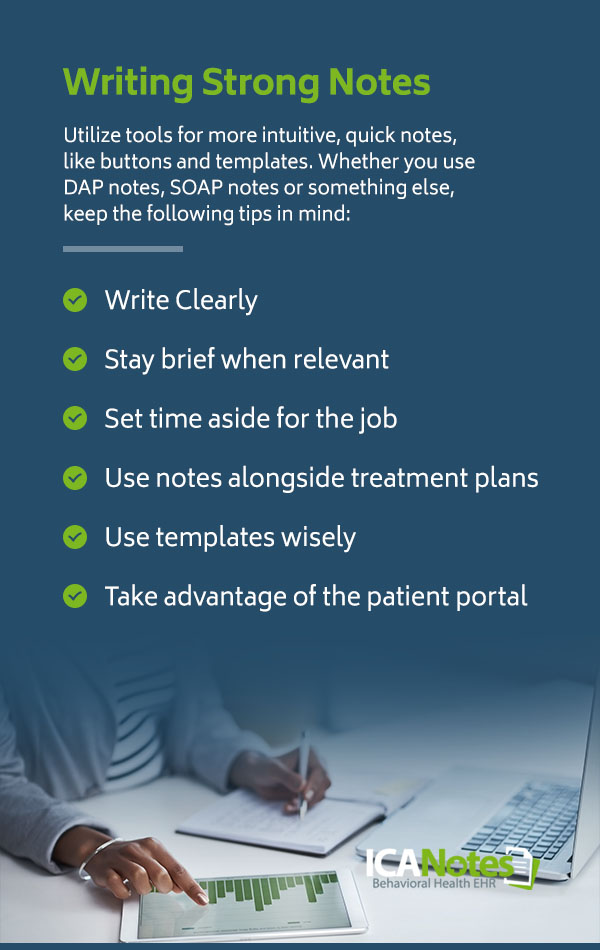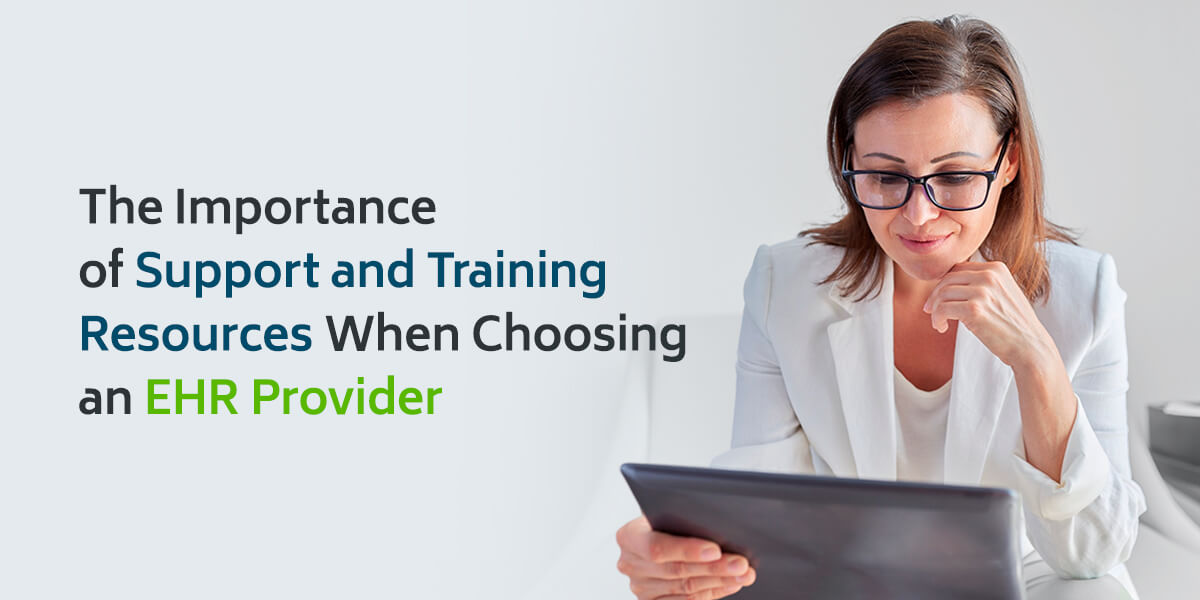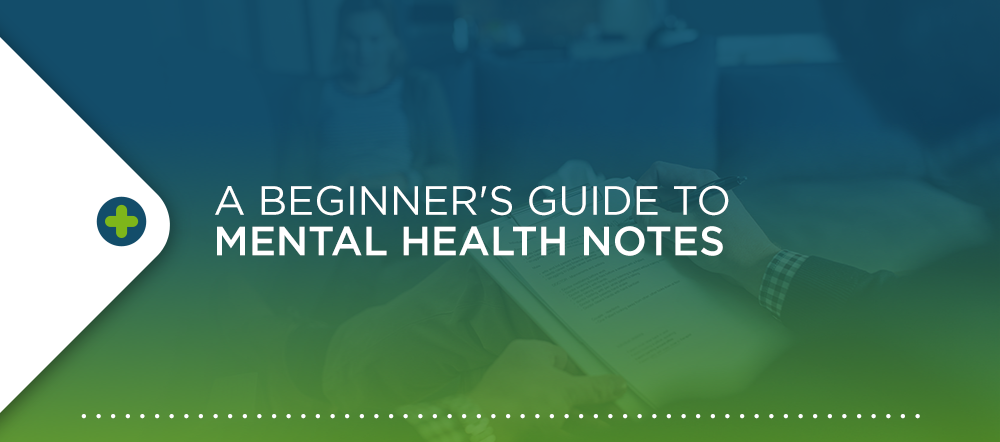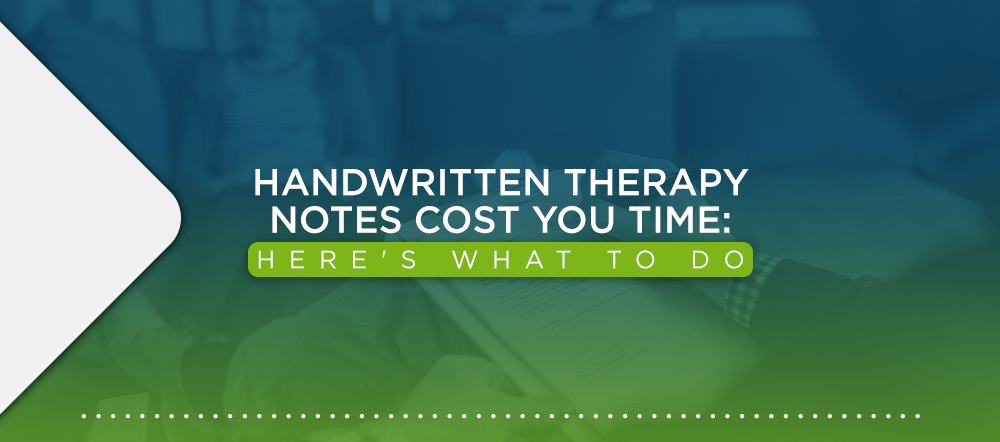Behavioral Health Case Management Best Practices
Behavioral health case management is a multifactor job. This comprehensive field requires an in-depth understanding of your patients, potential providers, various conditions and community resources. How do you keep a pulse on these different topics and offer your patients the best care possible? We've compiled some best practices for behavioral health case management so you can set patients up for success and make your workday smooth and efficient.
Table of Contents
- Communicate Regularly With the Patient
- Collaborate Effectively With Various Programs
- Use Leadership Skills to Motivate Your Team
- Regularly Evaluate the Effectiveness of Treatment Programs
- Maintain Strong Organization and Time Management
- Automate Administrative Tasks
- Write Strong Notes
- Stay Empathetic
- Learn More About How ICANotes Can Help
Communicate Regularly With the Patient
In behavioral health, communication is crucial and not just during initial evaluations. Regular, ongoing communication is necessary for understanding patient progress and attitudes toward care. Subjective responses like surveys and direct questions can be helpful, but, if applicable, you'll also want to pay attention to:
- What the patient's family members or significant other have to say. These elements can provide more objective insight into the patient's condition.
- Nonverbal communication and other vocal aspects like pitch, tone and inflection can all suggest responses that differ or add nuance to verbal communications.
Try to regularly communicate with patients and family members to get these insights. In-person meetings are great, especially for those nonverbal cues, but you can also keep in touch more often through secure messaging. These informal discussions allow you to stay on top of day-to-day changes and can help improve your relationship with the patient. The more efficiently and more often they can reach you, the better.
Another essential form of patient and caretaker communication is education. When patients don't understand their illness or treatment plan, they don't have the full picture of how they can improve. In one study, patients who received education on the relationship between their mental health problems and physical health outcomes saw a range of the following positive effects:
- Their anxiety was reduced by 35%.
- Their understanding was increased by 26%.
- Their motivation to make changes increased by 26%.
Try to provide patient education where possible and offer additional resources if necessary. For some, this can be as simple as giving them informational handouts.
FREE Download: Case Management Note Checklist

Collaborate Effectively With Various Programs
As a case manager, you likely work with various programs within your facility and community. Keeping them updated is a necessity. Appropriate collaboration is a vital part of the relationship between care managers and providers. With an open line of communication between the two, you can better ensure quick responses and a cooperative approach to care.
Stay in touch with these different programs and teams and send consistent updates. This might come from thorough notes or updates in your electronic health record (EHR) system or regular meetings and discussions with a point of contact, such as an organizer at a residential facility. Some topics to cover include progress toward goals, any new obstacles and other changes that may play a role in the treatment plan.
Case management also involves a strong element of advocacy. In addition to knowing which resources are available to you and your patients, strong advocacy includes knowing local laws and regulations that might affect a patient's eligibility for or entitlement to some services. You may need to brush up on your negotiation skills and find creative solutions when encountering resistance. It also helps to provide patients with opportunities to speak up and advocate for themselves.
Behavioral health case managers play an essential role in identifying gaps in care. Part of a collaborative approach means knowing where treatment options are inadequate and working with your partners to solve the problems.
Use Leadership Skills to Motivate Your Team
Case managers must take on leadership roles with many different people on their team, such as social workers, counselors and physicians. Without a clear leader or point of contact, it's easy for a treatment plant to lose steam. By taking on this role, you can motivate and organize your team to be more effective.
You'll delegate tasks and monitor the "big picture" of treatment. That also means prioritizing certain aspects of care and managing time appropriately. You may find yourself solving problems for most of the day, so creative, critical thinking is essential, as is the ability to take initiative and act on plans.
A significant component of leading a team is making sure motivation and morale stay up. A case manager often needs to get a behavioral health team excited about what they can do. This will look different from team to team, but lean on traditional leadership skills like transparency, delegation, team building and dependability to get everyone on the same page and feel empowered in their ability to help patients.
Regularly Evaluate the Effectiveness of Treatment Programs
Treatment programs are not a one-and-done solution. They are dynamic and need to be consistently reevaluated based on changes in the patient's life, to program offerings and, of course, with treatment progress. Evaluations should factor in aspects like patient strengths and concerns, support systems in place, the patient's access to resources and their willingness and confidence to make changes. You may need to make evaluations across a range of settings, such as inpatient, assisted and community settings, as the patient receives treatment.
The best way to evaluate a treatment's effectiveness is to create measurable, observable goals you can check on during regular assessment periods. You could record values, such as:
- Percentage of appointments held vs. missed
- Percentage of goals met
- Changes in health status
- Questionnaire responses
- The number of unplanned visits to the ER or readmissions
Check in on these values regularly and use them to adapt and inform your use of different programs. You may also want to track the effectiveness of programs overall. If you find that many patients aren't benefiting from a program, such as a transportation service, you could look into alternative options.
Maintain Strong Organization and Time Management
What is behavioral health case management without strong organization? With multiple entities, conditions, clients and providers to juggle, organization in case management is critical. It can make your day easier to manage and save precious time. Every case manager's environment looks different, so take some time to figure out what works for you. Gauge your typical workflow and see if you can find areas to streamline your work.
Organizing your workflow might look like taking 10 minutes out of your morning to set aside the cases you'll be working with that day. Or you may create an easy-access list of resources that speeds up the time it takes to reach out or provide links to clients. Try to bookend your days by devoting time to stay organized after you get in and before you leave.
Some of the most valuable organizational tools are digital. Think about how much a clunky or uncooperative electronic health record can affect your workday. The right EHR platform can help you:
- Streamline note-writing and document collection: Use customizable templates to create meaningful notes in as little time as possible and scan in documents to keep all paperwork in one spot and connected to patient charts.
- Speed up assessments: Eliminate time spent digging through paper assessments. Storing assessments digitally allows you to access them while recording answers linked to the patient's chart. You can also track score changes over time.
- Access charts from any device: If juggling papers is a problem for you, storing everything in a cloud-based EHR is a great way to access data from just about anywhere. You can even do charting or enter in results from a tablet, eliminating the need to carry around binders and notebooks.
- Schedule: A digital calendar can convert time zones, send you notifications and allow other workers, such as receptionists, to add appointments to your calendar. You can stay on top of your day more easily and accurately while accessing your schedule anywhere.
- Communicate with clients and partners: Keep your messages in one place and tie them into patient notes for greater organization and visibility. You can even securely send records to external parties.
Automate Administrative Tasks
Day-to-day administrative tasks are necessary, but they don't need to take as much time out of your day as they do. From complex coding demands to appointment confirmations, you can automate many different tasks in the case management workload. An EHR's digital capabilities allow you to automate parts of the process, with large and small changes that add up over time.
Consider the different types of data you may need to collect, such as information from labs, clearinghouses and health information exchanges (HIEs). If your EHR has integrations with these platforms, gathering the data can be as simple as a click. There's no need to scan in paperwork, fight with fax machines or track down the files in your computer. Instead, you can automate the data ingestion process through these easy integrations.
Other processes you may be able to automate include:
- Checking insurance eligibility and capturing or looking up insurance card information
- Entering in assessment results or summaries instead of recording results directly into the patient chart
- Following up with providers on appointment attendance data
- Maximizing a practice's reimbursement and the services you can offer to the patient
- Measuring various patient outcomes, such as functional, cognitive and emotional measures
When done many times a day, even small tasks can add up, so automating wherever possible is a great way to work more efficiently and make your day easier.
Write Strong Notes
Notes are a key part of any behavioral health practice, and poor notes can create problems for administrators and patients alike. Strong case management notes should address various aspects of patient health, such as physical, psychosocial, environmental, financial and vocational elements. Be sure to touch on aspects that will affect patient progress, too, such as their potential for community reintegration or willingness to learn new strategies.
These notes provide a touchstone for everyone working on the patient's case to access and understand the whole picture, including the case manager. You won't remember everything you discuss during visits or how pressing a particular topic may be, and strong notes can help carry that information to a later time.
Your notes must be strategic and written in a manner that's easy to understand and comprehensive, but you also can't spend hours writing your notes every day. Utilize tools for more intuitive, quick notes, like buttons and templates. Whether you use DAP notes, SOAP notes or something else, keep the following tips in mind:
- Write clearly: It's easy to write notes you know you'll understand, but what about the other people involved in your patient's case? Write objectively and clearly to ensure that others can understand your notes.
- Stay brief and relevant: Make sure your notes are short, to the point and applicable to the situation. Know what's necessary based on administrative and care requirements, and use factual data.
- Set time aside for the job: Try not to rush your notes. Allot time for note-writing after a meeting so you stay accurate and focused.
- Use notes alongside treatment plans: Notes should inform treatment and vice versa. Use your notes to track progress and inform treatment plans.
- Use templates wisely: Templates are an excellent resource for getting started, but they should only form the structure of your notes. Be sure to complement templates with detailednotes.
- Take advantage of the patient portal: If you use a patient portal, you can have the patient input many changes on their own, such as medications or address changes, for easier notes.
Stay Empathetic
As a case manager, you are your patients' best advocate. Empathy is vital in performing your role effectively. From recommending necessary services to collecting data that illustrates patient needs, your care depends on understanding their situation. Many health and social care providers struggle to stay empathetic due to a lack of time, high stress levels and high patient loads.
While the demands of the job can be taxing, always try to remember the person behind the notes. Take time to get to know them and understand what affects them the most. You can prioritize the issues that are most important to them for impactful, person-centered care.
Some tips for retaining empathy during mental health work include:
- Listen without judgment: Avoid making assumptions or judgments so you can better understand the patient's thoughts and feelings.
- Stay in the moment: Giving the patient your full attention and showing it through body language and cues can help you better engage with the patient's situation.
- Remove barriers: Break down any preconceived notions, ideas or stereotypes you may have about the patient so you can see things from their point of view without a clouded perception.
To focus on maintaining empathy, try spending a few minutes each week, or even after every meeting with a client, to evaluate these elements and reflect on the patient's situation.
Learn More About How ICANotes Can Help
Between advocating for patient services, staying organized and working with team members, good behavioral health case management requires the right tools. ICANotes, the EHR designed for behavioral health, is packed with features for simple and effective case management. From note-writing templates and in-platform messaging to quick document uploading and secure communications, ICANotes can help you.
This cloud-based EHR is fully compliant with the Health Insurance Portability and Accountability Act (HIPAA) and helps ease case management in many behavioral health settings. Learn more about how ICANotes can help you stay organized and deliver better care. You can reach out to us with any questions, start a free trial or request a live demo.
Related Posts
Writing Effective Case Management Notes
The Role of a Social Worker in Behavioral Health
What Are Social Determinants of Health (SDOH) and Why Are They Important?














